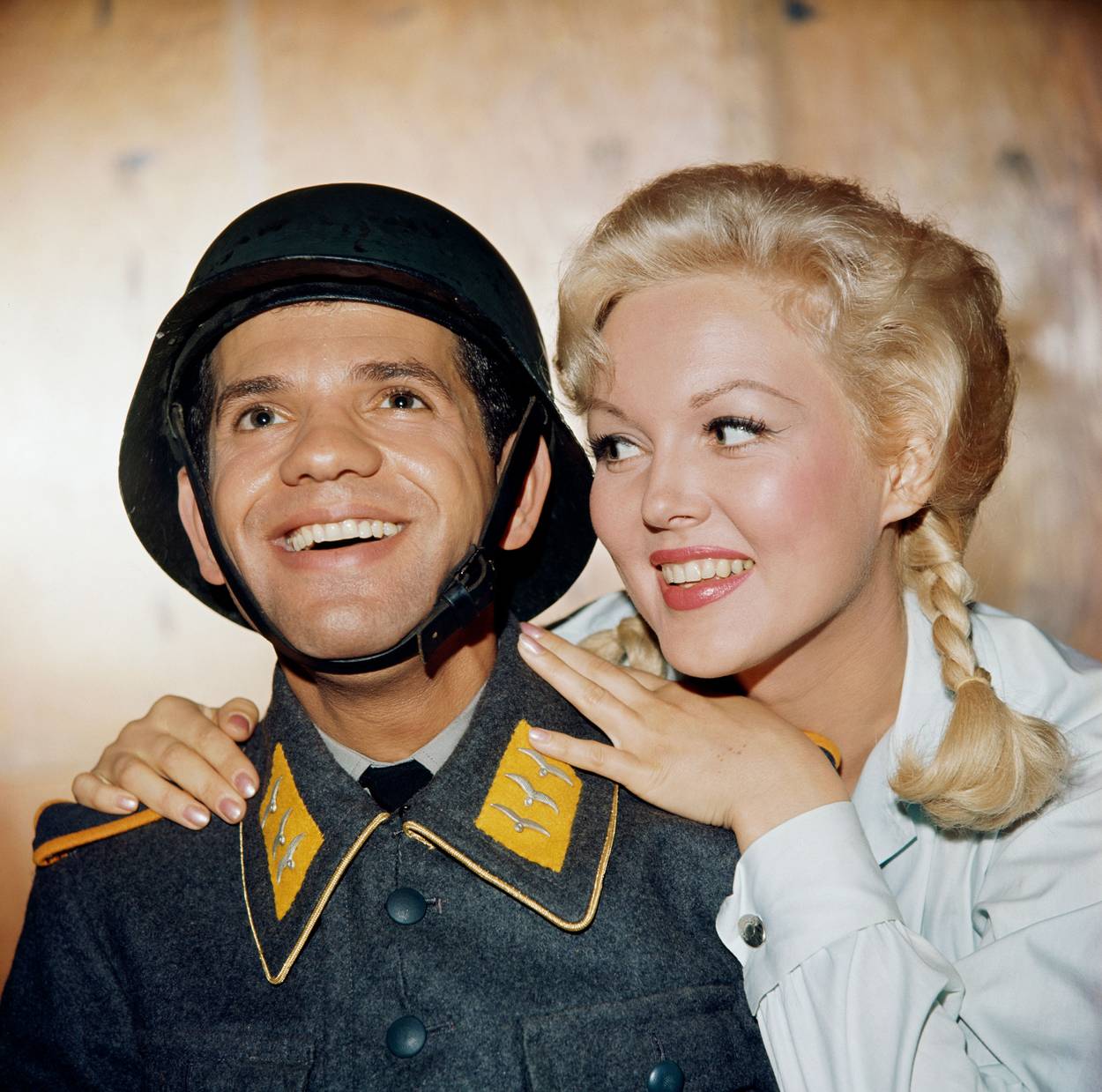This story was published as a Bastille Day homage but more than that I think it's just wild that a concentration camp survivor ended up on a television show whose entire premise was mocking Nazis. You go, LeBeau!
From Tablet Magazine, July 13:

A week after Patton’s Third Army liberated Buchenwald, on April 19, 1945, the inmates gave a concert for the soldiers who had freed them. Fourteen Czech, German, Dutch, Belgian, and French musicians made up the band. The Simon Wiesenthal Center in Los Angeles has the fading typed program on exhibit: There were sax, brass, and rhythm sections, and a sole vocalist—a Frenchman, Robert Widerman, who sang “In the Mood,” “A Tisket, A Tasket,” and “Honeysuckle Rose.” He also performed both roles in a Mickey and Minnie Mouse skit of his own creation, which had been a hit with the Nazis and kapos.“We performed on the stage, in our striped uniforms, exhilarated by our new freedom, and gave the greatest show of our lives which hundreds of GIs and inmates applauded and shouted,” he noted in his memoirs. They closed the set with a “walloping version of ‘Tiger Rag.’”
A few weeks later, back home in Paris, the boyish but indefatigable Widerman, age 19, opened at the legendary Olympia on the Boulevard des Capucines, then one of the many Parisian venues requisitioned for American soldiers’ entertainment. He was the fourth on the bill, in an unenviable slot right after a performing dog act that always thrilled audiences. His first number was “Flat Foot Floogie,” followed by “Daisy Venez Avec Moi.” The audience wasn’t buying it. He was distraught at the perfunctory applause. “I had two more numbers to do, and I was having flop-sweat. I didn’t understand—they loved me in Buchenwald!”
The singer, who had changed his surname to Clary, took gigs all over Paris, working full time, dancing with socialites and prostitutes (“I remember one in particular. She was tall and looked like Joan Crawford … a very good jitterbugger. We had a ball on the dance floor.”) He performed in blackface. He made friends with Charles Aznavour. He relocated to the south of France and worked around the clock.
Then, in 1947, American musicians went on strike. U.S.-based record producers scoured Europe for talent and one of the shrewdest A&R men, Harry Bluestone, visited France and immediately took to Clary, who was then touring on the Riviera. Thanks to Bluestone, lightning struck. Clary recorded a few songs which, a world away and unbeknownst to him, became hits in the U.S. His rendition of “Put Your Shoes on, Lucy” sold half a million copies and he charted on Billboard.
Offered a residence visa to move to the U.S., Clary did not hesitate, and manfully worked through the tearful adieus in France to a stay in New York and then Los Angeles. Meanwhile, his beloved sister Nicky, his family’s only other death camp survivor, had married a Texan and began what would be a long and happy life in suburban Dallas. (Clary would later visit there and serenade this sister and an overflow audience of Pepsi executives, including Richard Nixon, their lawyer, and Joan Crawford, wife of the CEO, on the eve of President Kennedy’s assassination, and continue to perform at the venue into mid-November, to predictably paltry audiences.)
The Kennedy assassination shocked but did not devastate a man who had spent years falling asleep next to death camp berth mates who would become corpses by the morning. But he had made a firm decision to veil his tragic youth in the past. Instead he faced the future, aspiring to music and comedy. His albums, a mix of ebullient French- and English-language standards, sold well.
“Robert Clary began singing as long ago as he can remember,” read the prim liner notes of the 1955 album Meet Robert Clary. “Just as he was hoping to begin on a singing career, he was uprooted by the war and sent to a prison camp for the duration. With the coming of peace, he made the rounds of French radio stations and cafes … [which] led to an engagement at Olympia Hall in Paris, and his career had begun.”....
....MUCH MORE